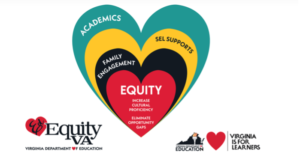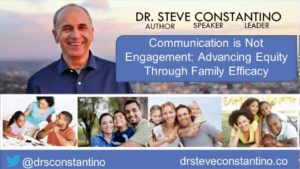Building Inclusive Classrooms With EdEquity 5Cs Framework
By Daria Lorio-Barsten, M.Ed., Christine Peterson, M.Ed., and LaShauna Britt, M.Ed.

This article was originally published on October 29, 2021. On February 9, 2022, the Virginia Department of Education “rescinded all resources included on VDOE’s EdEquityVA website including EdEquityVA resources and resource repository” (VDOE, 2022, p. 1). This article is archived, and links may not be active.
Centering Equity
By Cathy Buyrn

In the spring of 2021, the Link Lines Administrator’s Corner focused on courageous leadership, one of Virginia’s EdEquity 5Cs (i.e., courageous leadership, continuous reflection, curriculum reframing, compassionate student & family engagement, and culturally responsive practices). In this edition’s Educators’ Lesson, Building Inclusive Classrooms With EdEquity 5Cs Framework provides a broad overview of the 5Cs at the classroom level. In order to ensure that students and families experience inclusive classroom learning environments, school leaders must engage in practices that center equity and build capacity among staff.
An important practice for courageous leaders is using data to “make inequities visible” (VDOE, 2020a, p. 24). Every layer of the school community should be vigorously examined in order to identify any potential biases or inequities. To do so, school leaders should review mission statements, symbols, traditions, academic programs, extracurricular programs, code of conduct policies, dress codes, assessment results, and other resources with a critical lens focused on:
- Race/ethnicity
- Gender
- Native language
- Ability/disability
- Gender identity
- Sexual orientation
- Socioeconomic status
(VDOE, 2020b, p. 2)
School leaders can use the Navigating EdEquity: Equity Audit Tool developed by the Virginia Department of Education’s Office of Equity & Community Engagement (VDOE, 2020b) to engage in a robust examination of their school communities.
Once they have used data to “make inequities visible” (VDOE, 2020a, p. 24), they must carefully consider how to “normalize conversations about race, racism, and inequity” (p. 24). While these topics can be uncomfortable for some stakeholders, establishing an equity baseline is an important part of creating conditions that enable meaningful and continuous reflection.
The EdEquityVA webinar series episode Continuous Reflection for Equity (VDOE, 2021, April 29) introduces school leaders to a continuous reflection cycle that helps them engage in practices that “eliminate the predictability of student outcomes based on race, gender, zip code, ability, socioeconomic status, or language spoken at home” (slide 5).
EdEquityVA Webinar Series: Continuous Reflection for Equity
 Click image to access webinar episode.
Click image to access webinar episode.
Courageous school leaders should first use school data to engage in reflection individually and with other school leaders before facilitating discussions with staff and other stakeholders. Such discussions will be more productive if the data is clear, shared responsibility is future-focused rather than blame-based, and if norms are established for safe reflection and respect for all stakeholders. While school leaders need to “disrupt discourse, practices, and policies that perpetuate inequities” (VDOE, 2020a, p. 24), they should select activities that move beyond political or ideological divisions and encourage solution-focused problem solving. The expectation that Virginia school leaders center equity in their schools is a non-negotiable and should not be discussed as a debatable goal.
Compassionate engagement with students and families is a critical practice for educators at all levels. Compassionate practices go far beyond compliance-centered activities (e.g., language translations, multicultural activities focused on food, notices about disability rights, tracking event attendance). Courageous school leaders are prepared to make sure that compassionate engagement efforts are “culturally and economically competent, asset based, and trauma informed” (VDOE, 2020b, p. 9). Educators at all levels also need to be prepared to receive emotionally charged feedback from students and families who may be experiencing trauma outside of the school community and potentially trauma caused by school-based inequities and biases. It is important to remember that “anger is a mask for fear” (Constantino, 2019, 43min 32sec). School leaders will need to help staff practice skills that reduce defensive responses and increase de-escalation that results in compassionate engagement and informs continuous reflection.
The EdEquityVA webinar series episode focused on family engagement (Communication Is Not Engagement) outlines practices that makes clear the distinction between communication and meaningful engagement (Constantino, 2019). Constantino’s (2019) high-impact-engagement practices (e.g., family academic socialization, efficacy-based activities, interactive homework design, home learning supports, home visits) may be used to establish compassionate engagement practices and shift resources from low-impact practices to practices that are more likely to improve student outcomes for historically marginalized groups of students.
EdEquityVA Webinar Series: Communication Is Not Engagement
 Click image to access webinar episode.
Click image to access webinar episode.
Courageous school leaders must engage in centering equity as individuals and facilitate the process for stakeholders, considering every layer of the school community. Some of those conversations will be challenging, but the issues need to be addressed directly to establish shared goals, a focus on the data, and effective equity strategies. Establishing equitable practices is an urgent and worthwhile priority. The Link Lines Administrator’s Corner will continue to connect school leaders to resources and tools focused on EdEquityVA during the 2021-2022 school year. Please feel free to share your progress on the EdEquityVA 5Cs as a courageous school leader by responding in the Comments section or contacting me directly (cabuyrn@wm.edu). Check out the classroom-level resources in this edition’s Educators’ Lesson Building Inclusive Classrooms With EdEquity 5Cs Framework and also direct your teachers to these powerful resources.
References
Constantino, S. (2019, November 8). Communication is not engagement: Advancing equity through family efficacy [Webinar]. Virginia Department of Education (VDOE) Office of Equity & Community Engagement. https://www.youtube.com/watch?v=0oB8-VVSUPQ&list=PLRTyI0-OTuVOKkOumXX2Sq8KdDUJyAsad&index=5
Virginia Department of Education (VDOE) Office of Equity & Community Engagement. (2020a). Navigating EdEquityVA: Virginia’s road map to equity. http://www.virginiaisforlearners.virginia.gov/edequityva/
Virginia Department of Education (VDOE) Office of Equity & Community Engagement. (2020b). Navigating EdEquityVA: Equity audit tool. https://www.virginiaisforlearners.virginia.gov/wp-content/uploads/2020/11/Navigating-EdEquityVA-Equity-Audit-Tool.pdf
Virginia Department of Education (VDOE) Office of Equity & Community Engagement. (2021, April 29). EdEquityVA webinar series: Continuous reflection for equity [Webinar]. https://www.youtube.com/watch?v=_S5fkvyt8D





